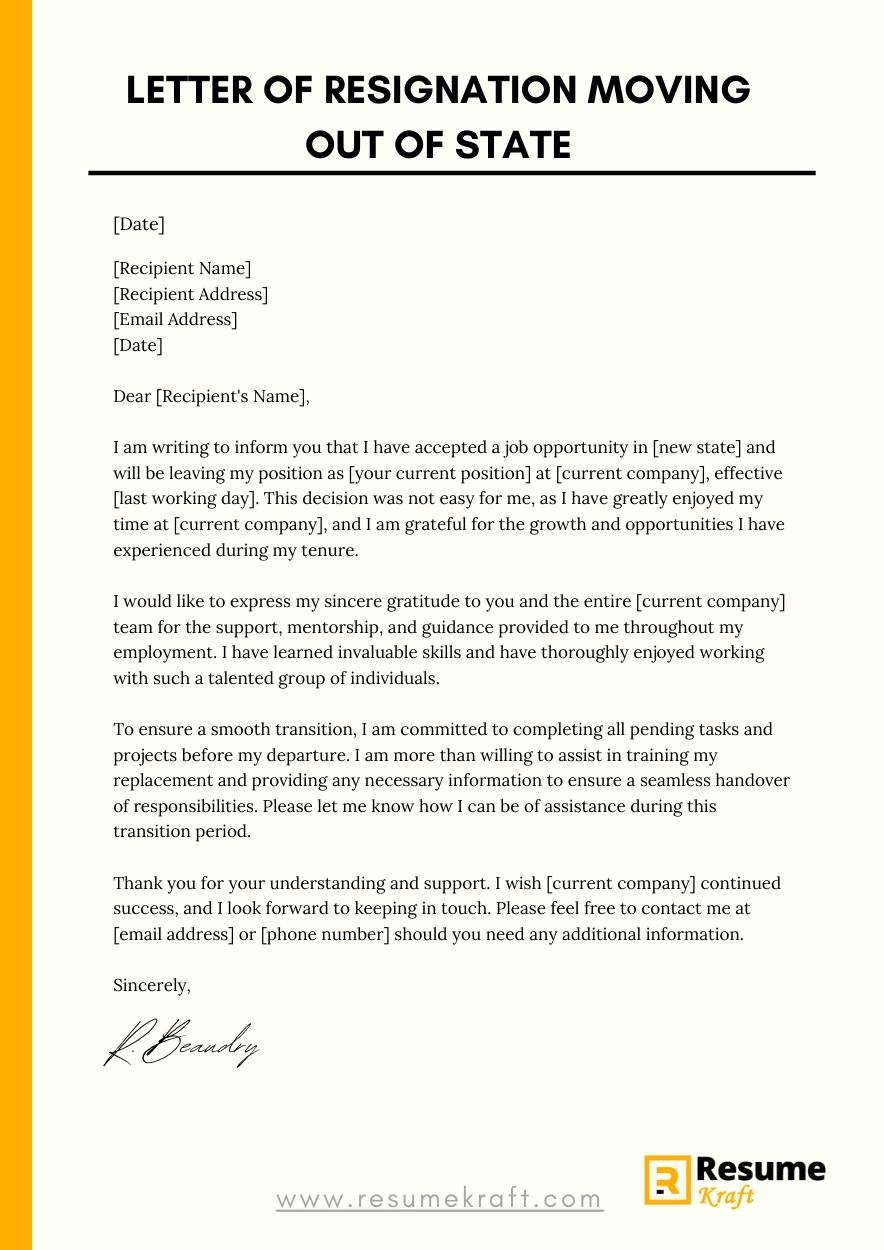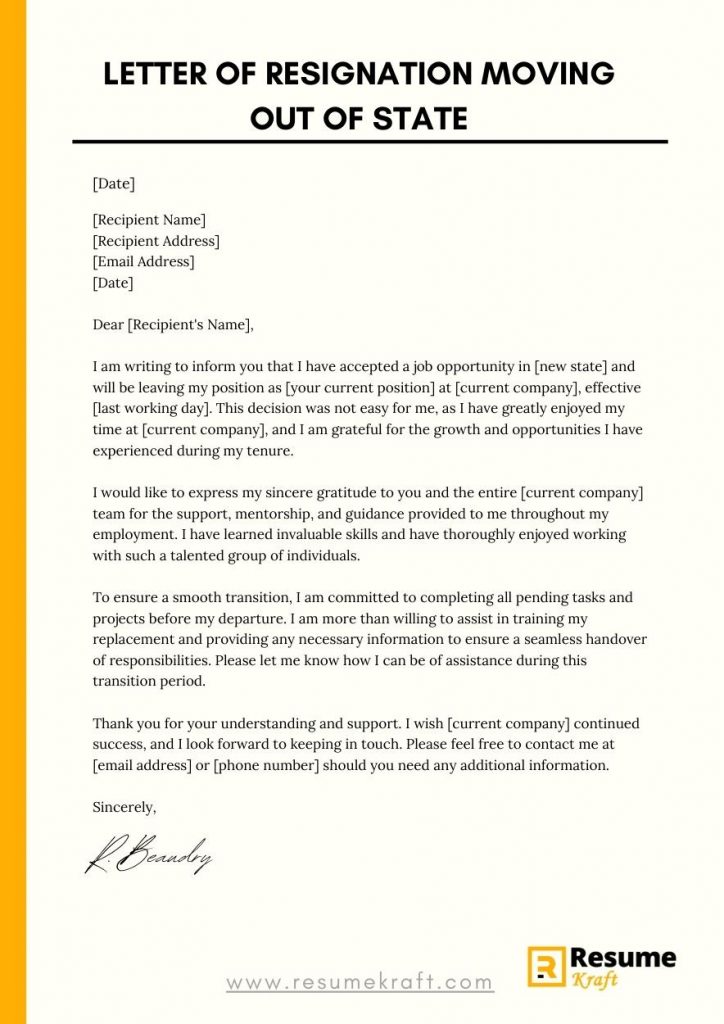
Leaving a job can be an emotional and challenging experience, especially when you’re moving out of state. One important step in this process is writing a resignation letter that effectively communicates your decision to your employer. In this guide, we will provide you with valuable tips and samples to help you write a resignation letter when moving out of state.
It is crucial to remember that a resignation letter is a professional document and should be drafted with care. Your resignation letter not only serves as a formal notification to your employer but also sets the tone for future communication. Follow the guidelines below to ensure your resignation letter is effective and respectful.
- What to Include in a Resignation Letter
- What Not to Include in Your Resignation Letter
- How To Format a Resignation Letter
- Resignation Letter Samples When Moving Out of State
- Key Takeaways
- Frequently Asked Questions
- Q1: Can I mention the reason for my resignation in the letter?
- Q2: Is it necessary to offer assistance in the transition process?
- Q3: Should I mention my new employer in the resignation letter?
- Q4: Can I send a resignation email instead of a printed letter?
- Q5: How much notice should I give when resigning due to relocation?
- Conclusion
What to Include in a Resignation Letter
When writing a resignation letter when moving out of state, it is important to include the following key elements:
- Your Contact Information: Include your full name, address, phone number, and email address at the top of your resignation letter.
- Date: Clearly state the date when you are submitting the resignation letter.
- Recipient’s Contact Information: Include the recipient’s name, job title, company name, and company address.
- Salutation: Begin the letter with a formal salutation, using the recipient’s name (e.g., “Dear Mr. Smith” or “Dear [Company Name] HR Department”).
- Statement of Resignation: Clearly state your intention to resign and mention the date of your last working day. This can include a brief explanation, such as “I am writing to inform you that I have accepted a job opportunity in [new state] and will be leaving my position at [current company], effective [last working day].”
- Express Gratitude: Express gratitude for the opportunities and experiences you have had during your tenure with the company. This shows your appreciation for the time spent and helps maintain a positive relationship.
- Smooth Transition Offer: Offer to assist in the transition process by providing a smooth handover of your responsibilities. This demonstrates professionalism and a commitment to the company’s success.
- Closing: Conclude your resignation letter with a polite and professional closing, such as “Sincerely” or “Best Regards.” Sign your name and type your full name beneath your signature.
- Attachments: If necessary, mention any attachments or supporting documents you are including with your resignation letter (e.g., a formal resignation notice or a resignation acceptance email from your new employer).
What Not to Include in Your Resignation Letter
While it is important to include relevant information in your resignation letter, there are certain things you should avoid including:
- Negative Remarks: Avoid including negative comments or expressing grievances about your current employer or colleagues. Maintain a professional tone and focus on the positive aspects of your employment.
- Personal Details: It is not necessary to go into personal details regarding your relocation, unless it directly impacts your ability to continue working for the company. Stick to the important professional aspects of your resignation.
- Negative Reasons for Leaving: Instead of emphasizing the negative reasons for your resignation, focus on the positive opportunities and growth prospects that led to your decision to relocate.
- Excessive Detail: Keep your resignation letter concise and to the point. Avoid providing excessive detail or unnecessary information that may overwhelm the recipient.
- False Promises: While it is courteous to offer assistance during the transition process, avoid making false promises or commitments that you are unable to fulfill. Be realistic about your availability and support.
Now that you know what to include and what not to include in your resignation letter when moving out of state, let’s explore how to properly format your letter.
How To Format a Resignation Letter
Proper formatting plays a crucial role in creating a well-written resignation letter. Follow these formatting guidelines:
- Use a Professional Tone: Maintain a professional and respectful tone throughout your resignation letter. Avoid using informal language or slang.
- Choose a Standard Font and Size: Use a standard font (e.g., Arial, Times New Roman) with a font size of 10 to 12 points. This ensures readability and consistency.
- Use a Formal Business Letter Structure: Structure your resignation letter like a formal business letter, including a proper salutation, body paragraphs, and closing. Use single line spacing and leave a blank line between paragraphs.
- Keep It Concise: Ensure your resignation letter is not too lengthy. Stick to the necessary details and keep it succinct.
- Proofread and Edit: Before submitting your resignation letter, proofread it for grammar, spelling, and punctuation errors. Ensure there are no typos or formatting inconsistencies.
Now that you are familiar with the key elements and formatting guidelines, let’s see some resignation letter samples when moving out of state.
Resignation Letter Samples When Moving Out of State

Printed Resignation Letter Sample
[Your Name]
[Your Address]
[City, State, ZIP]
[Email Address]
[Phone Number]
[Current Date]
[Recipient’s Name]
[Recipient’s Job Title]
[Company Name]
[Company Address]
[City, State, ZIP]
Dear [Recipient’s Name],
I am writing to inform you that I have accepted a job opportunity in [new state] and will be leaving my position as [your current position] at [current company], effective [last working day]. This decision was not easy for me, as I have greatly enjoyed my time at [current company], and I am grateful for the growth and opportunities I have experienced during my tenure.
I would like to express my sincere gratitude to you and the entire [current company] team for the support, mentorship, and guidance provided to me throughout my employment. I have learned invaluable skills and have thoroughly enjoyed working with such a talented group of individuals.
To ensure a smooth transition, I am committed to completing all pending tasks and projects before my departure. I am more than willing to assist in training my replacement and providing any necessary information to ensure a seamless handover of responsibilities. Please let me know how I can be of assistance during this transition period.
Again, I want to thank you for the opportunities and experiences I have had at [current company]. I am confident that the skills and knowledge I have gained here will contribute to my success in [new state]. Please extend my gratitude to the entire team for their support.
If there are any further steps or formalities required for the resignation process, kindly let me know, and I will complete them promptly.
Thank you for your understanding and support. I wish [current company] continued success, and I look forward to keeping in touch. Please feel free to contact me at [email address] or [phone number] should you need any additional information.
Sincerely,
[Your Name]
[Your Typed Name]
Email Resignation Letter Example
Subject: Resignation – [Your Name]
Dear [Recipient’s Name],
I hope this email finds you well. After much consideration, I have made the difficult decision to resign from my position as [your current position] at [current company]. My last working day will be [last working day].
I have recently accepted a job opportunity in [new state], which requires me to relocate. While I am excited about this new chapter in my life, I am also grateful for the experiences, knowledge, and support I have received during my tenure at [current company].
I want to express my sincere thanks to you and the entire team at [current company]. The guidance and opportunities I have received have been invaluable, and I am confident that the skills I have developed here will serve me well in my future endeavors.
During my remaining time, I am committed to ensuring a smooth transition. Please let me know how I can be of assistance in transferring my responsibilities or training a replacement. I am more than willing to help in any way possible.
If there are any formalities or additional steps required for the resignation process, please inform me, and I will complete them promptly.
Thank you for your understanding and support. It has been a pleasure working with you and the team. Please keep in touch, and feel free to contact me at [email address] or [phone number] for any further discussion or clarification.
Best regards,
[Your Name]
Please note that these are just samples, and you should customize them based on your specific situation and relationship with your employer.
Key Takeaways
Writing a resignation letter when moving out of state can be a challenging task. Here are the key takeaways to keep in mind:
- Include essential information, such as your contact information, the date, recipient’s information, and a clear statement of your resignation.
- Express gratitude for the opportunities and experiences you have had at your current company.
- Offer assistance in the transition process to ensure a smooth handover of responsibilities.
- Keep your resignation letter concise, professional, and free from negative remarks or excessive personal details.
- Choose an appropriate format, proofread for errors, and maintain a respectful tone.
Following these guidelines will help you draft a well-written resignation letter that conveys your decision to move out of state professionally and respectfully.
Frequently Asked Questions
Q1: Can I mention the reason for my resignation in the letter?
A1: While it is not necessary to provide a detailed explanation, you can briefly mention the reason for your resignation, such as accepting a job opportunity in another state. However, avoid dwelling on negative aspects and focus on the positive aspects.
Q2: Is it necessary to offer assistance in the transition process?
A2: Offering assistance in the transition process is a professional gesture that demonstrates your commitment to a smooth transition. However, the extent of your assistance may vary based on your specific circumstances and the needs of your employer.
Q3: Should I mention my new employer in the resignation letter?
A3: It is not necessary to mention your new employer in the resignation letter. The focus should be on expressing gratitude, stating your intention to resign, and offering assistance during the transition period. If your employer asks about your future plans, you can share the information at that time.
Q4: Can I send a resignation email instead of a printed letter?
A4: Yes, an email resignation is acceptable, especially if your company permits or prefers electronic communication. Follow a similar structure as the printed resignation letter, including a clear statement of resignation, gratitude, and an offer to assist in the transition. Be sure to use a professional tone and include your contact information.
Q5: How much notice should I give when resigning due to relocation?
A5: It is customary to provide at least two weeks’ notice when resigning from a job. However, when moving out of state, it is considerate to provide additional notice if possible. This allows your employer more time to make necessary arrangements and find a suitable replacement.
Remember, these are general guidelines, and it’s important to consider your specific situation and company policies when writing your resignation letter.
Conclusion
Writing a resignation letter when moving out of state requires careful thought and consideration. By including the necessary elements, maintaining a professional tone, and offering assistance during the transition process, you can ensure a respectful and smooth exit. Use the provided resignation letter samples as a starting point and customize them to suit your specific circumstances. Remember, a well-written resignation letter not only preserves your professional reputation but also strengthens your relationship with your current employer.

